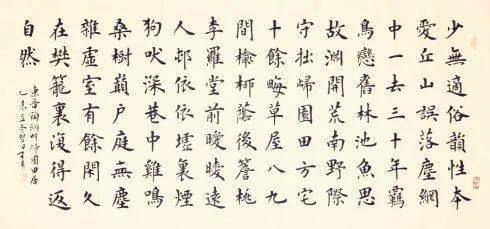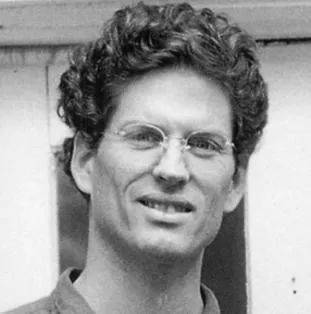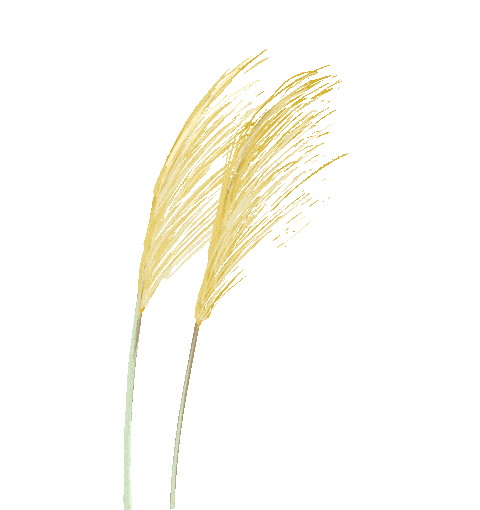陶渊明《归园田居·少无适俗韵》的四种英译 |
您所在的位置:网站首页 › 归园田居翻译高一 › 陶渊明《归园田居·少无适俗韵》的四种英译 |
陶渊明《归园田居·少无适俗韵》的四种英译
|
《归园田居·少无适俗韵》及其英译本
陶渊明《归园田居·少无适俗韵》 Returning to the Farm to Dwell Ⅰ From early days I have been at odds with the world; My instinctive love is hills and mountains. By mischance I fell into the dusty net And was thirteen years away from home. The migrant bird longs for its native grove. The fish in the pond recalls the former depths. Now I have cleared some land to the south of town, Simplicity intact, I have returned to farm. The land I own amounts to a couple of acres The thatched-roof house has four or five rooms. Elms and willows shade the eaves in back, Peach and plum stretch out before the hall. Distant villages are lost in haze, Above the houses smoke hangs in the air. A dog is barking somewhere in a hidden lane, A cock crows from the top of a mulberry tree. My home remains unsoiled by worldly dust Within bare rooms I have my peace of mind. For long I was a prisoner in a cage And now I have my freedom back again. translated by James Hightower (1970) 译者简介
海陶玮(James Robert Hightower, 1915-2006),美国汉学家、文学评论家,哈佛大学教授,专攻诗歌与文艺批评及翻译。著作及译作包括:《文学专题:纲要与书目》《韩诗外传》《陶潜诗选》《元稹和莺莺传》等,曾与叶嘉莹共同翻译《诗歌论集》。 Returning to Dwell in Gardens and Fields Ⅰ My youth felt no comfort in common things, by my nature I clung to the mountains and hills. I erred and fell in the snares of dust and was away thirteen years in all. The caged bird yearns for its former woods, fish in a pool yearns for long-ago deeps. Clearing scrub at the edge of the southern moors, I stay plain by returning to gardens and fields. My holdings are just more than ten acres, a thatched cottage of eight or nine rooms. Elms and willows shade eaves at the back, Peach and plum spread in front of the hall. The far towns of men are hidden from sight, a faint blur of smoke comes from village hearths. A dog is barking deep in the lanes, a rooster cries out atop a mulberry. No dust pollutes my doors or yard, empty space offering ample peace. For a long time I was kept inside a coop, now again I return to the natural way. translated by Stephen Owen (1996) 译者简介
宇文所安(Stephen Owen),哈佛大学詹姆斯·布莱恩特·柯南德荣休教授。著作包括《初唐诗》《盛唐诗》《中国传统诗歌与诗学》《追忆》《迷楼》《中国文学思想读本》、《诺顿中国文学作品选》《中国“中世纪”的终结》《中国早期古典诗歌的生成》《晚唐》《只是一首歌:中国11至12世纪初期的词》以及《杜甫全集》英文注译等。 Home Again among Fields and Gardens Ⅰ Nothing like all the others, even as a child, rooted in such love for hills and mountains, I stumbled into their net of dust, that one departure a blunder lasting thirteen years. But a tethered bird longs for its old forest, and a pond fish its deep waters—so now, my southern outlands cleared, I nurture simplicity among these fields and gardens, home again. I’ve got nearly two acres here, and four or five rooms in our thatch hut, elms and willows shading the eaves in back, and in front, peach and plum spread wide. Villages lost across mist-and-haze distances, kitchen smoke drifting wide-open country, dogs bark deep among back roads out here, and roosters crow from mulberry treetops. No confusion within these gates, no dust, my empty home harbors idleness to spare. After so long caged in that trap, I’ve come back again to occurrence appearing of itself. translated by David Hinton (2008) 译者简介
戴维·亨顿(David Hinton),美国诗人、汉学家,任教于哥伦比亚大学,曾以译作《李白诗选》《北岛诗集:零度以上的风景》《孟郊晚期诗选》荣获美国诗人协会的哈罗德·莫顿·兰登翻译奖,出版散文集《诗歌的荒原:对心灵与风景的探索》《存在的故事》等。 施家彰(Arthur Sze)的点评
翻译:崔瑞琪 / 审订:王柏华 《归园田居》组诗(“Returning to the Farm to Dwell”)是陶渊明(365-427)的诗歌代表作,共五首,其中的第一首主要表达作者回归乡村质朴生活的喜悦。陶渊明曾在朝为官十余年,渐觉颇受拘束而厌倦不满。公元405年,陶渊明退隐田园,每日种菊品酒,写诗作赋,修身养性,是中国早期诗歌传统中的著名隐士。 先看第一个译本,译者海陶玮(James Hightower)选择以一一对应的方式来翻译每一行。原诗为五言诗,每行的第二、三字间有节奏停顿,读作:1-2/3-4-5。海陶玮在翻译时略去这一停顿,只在第8行诗 [1] 中有所保留,其译作以平稳流畅而不失节奏感见长。他翻译时多采用终行句式 [2] ,因而译诗显得有分寸感,较为权威可靠。陶渊明原诗中多用对偶——“elms”(榆)和“willows”(柳)分别是第11行诗的头两个词,而第12行中的头两个词则相对应为“peach”(桃)和“plum”(李) [3] 。译作表述清晰,节奏有力,对原诗首末两个对句的表述简洁有效。 再看第二个译本,译者宇文所安(Stephen Owen)使用对句形式以突出原诗中的对偶成分。例如为了体现第15行和16行的头两个字 [4] ,译诗的对句将“a dog is barking”(狗吠)和“a rooster cries”(鸡鸣)相对照。同样地,首末的两个对句构拟出“自然”的概念:第2行中有“by my nature”(性本)的表述,而最后一行又以“I return to the natural way”(复得返自然)相回应。诗中末二字“自然”所表达的内在本质理念,实则是阐明陶渊明意旨之关键。“自然”在《道德经》中出现五次,代表着一种万物本性的自发与实现,它可被理解为“it-self becoming”(自为),蕴意为“the natural way of everything becoming itself”(万物自然形成的方式)。海陶玮将其译为“freedom”(自由),但从他的注释来看,“naturalness”(自然性)显然更贴合原意。 第三位译者戴维·亨顿也采用对句形式,他用“net”(网)和“caged in that trap”(在樊笼里)来增强诗中的仕途束缚之感,还将“性本爱丘山”译为“rooted in such love”(根植于..之爱),借以表明陶渊明对“丘山”感情之深厚。他在翻译时巧妙运用否定句,例如“nothing like all the others,”(与众不同)、“no confusion within these gates, no dust”(户庭无尘杂),展现出诗人的空寂感和在空旷空间中的精神体验,也为诗人的自我发现留足余地。“自然”被译成“occurrence appearing of itself”(自发性的发现),神秘的自然由此徐徐展开。 值得关注的是,三个译本对于诗歌中数字的处理各有不同。海陶玮改用西方的计量单位来描述原诗中的空间规模,将“方宅十余亩”翻译为“a couple of acres”(两三英亩),而“草屋八九间”则被翻译为“four or five rooms”(四五间屋);宇文所安选择尊重原诗中的数据,将其译为“ten acres”(十英亩)和“eight or nine rooms”(八九间屋);亨顿则和海陶玮一样,将其译为 “nearly two acres”(近两亩)和“four or five rooms”(四五间屋),但这样一来,原诗中的居所就变小了。此外,对于第四行诗 [5] ,三位译者都对原诗中明确指出的“thirty years”(三十年)视而不见,而将其译为“thirteen years”(十三年)。海陶玮觉得三十年的表述意义不大,十三年更符合政府官员的任期长短,所以他将原诗中的“ten”(十)和“three”(三)调换位置(从“三十”变为“十三”)。宇文所安和亨顿的译法和他如出一辙。 我不同意上述三人的看法,而是倾向于保留“thirty years”(三十年)的讲法,理由如下:原诗中明确指明“三十年”,无人对此发表过异议;其次,“三十年”的说法可能并不确切,但有一定道理——三十年时间相当于人的半辈子,这样表达更有冲击力。中国古代占星术中有十二生肖和五行(即金、木、水、火、土)的说法,将十二生肖和五行中的每种元素相对应,一个轮回为六十年,相当于人的一生。所以陶渊明的意思可以理解为,人一旦偏离正轨,往往穷其半生才得以醒悟。 总的来看,三个译本各有千秋,但都不能替代阅读原诗的体验。陶渊明这首诗歌中的韵律,与其描绘的充满道家思想的明朗画面,浑然天成又质朴严密,这些都是译作所难以传达的。这首诗值得反复咀嚼,回味悠长。 注释: [1] 即“守拙归田园”一句。——译注 [2] 又称结句行:又称结尾句或孤联诗句,每行诗句都包含完整的语法和句意,结尾处有标点。——译注 [3] 第11-12行诗为“榆柳荫后檐,桃李罗堂前”。——译注 [4] 第15-16行诗为“狗吠深巷中,鸡鸣桑树颠”。——译注 [5] 即“一去三十年”一句。——译注 附:施家彰的译本
Returning to Fields and Gardens I When I was young, I did not fit in with others, and simply loved the hills and mountains. By mistake, I fell into the dusty net and before I knew it, it was thirty years! The caged bird long for the old forest. The fish in the pond misses the old depths. I cultivate land along the southern wilds, and, keeping to simplicity, return to fields and gardens. Ten acres now surround my house; it is thatched, and has eight, nine rooms. Elms and willows shade the back eaves. Peach and plum trees are lined out the front hall. The distant village is hazy, hazy: and slender, slender, the smoke hanging over houses. Dogs bark in the deep lane, and a rooster crows on top of a mulberry tree. My house untouched by the dust of the world— ample leisure in these bare rooms. I was held so long inside a narrow bird- cage, but now, at last, can return to nature. 作者简介 施家彰(Arthur Sze),华裔美籍诗人,毕业于加州大学伯克利分校,曾担任布朗大学、巴德学院、那诺巴学院的驻校作家,现任美国印第安艺术学院创作系主任。出版诗集包括《杨柳风》《两只乌鸦》《眩惑》《河流,河流》《群岛》《流动的红蛛网:1970-1998诗作》《结绳记事》等,以及英译中国诗集《丝龙》。 译匠:以工匠精神精进翻译。 为广大客户提供各大行业语言翻译服务; 为广大学员提供优质语言翻译学习方案。 游戏笔译精品实训,一起来冲关打怪吧! 医学会议同传实训 汽车英语/翻译学习小组 医学英语/翻译学习小组 返回搜狐,查看更多 |
【本文地址】
今日新闻 |
点击排行 |
|
推荐新闻 |
图片新闻 |
|
专题文章 |





